- Clone
- 330-AJ (See other available formats)
- Regulatory Status
- RUO
- Other Names
- SLAM family receptor, SLAMF6, TCOM, SF2000, KALI, SF-3, NTBA, NTB-A, NK-T-B antigen
- Isotype
- Mouse IgG2a, κ
- Ave. Rating
- Submit a Review
- Product Citations
- publications
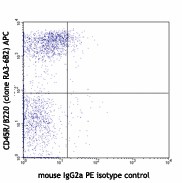
-

Balb/c mouse splenocytes double stained with 330-AJ PE (lower panel ) or mouse IgG2a PE isotype control ( upper panel ) and anti-mouse CD45R/B220 (clone RA3-6B2) APC -

| Cat # | Size | Price | Quantity Check Availability | Save | ||
|---|---|---|---|---|---|---|
| 134605 | 25 µg | $134 | ||||
| 134606 | 100 µg | $360 | ||||
Mouse Ly108, also known as SLAMF6 and NTB-A (NK cell, T cell, B cell antigen), is one of the members in The Signaling Lymphocytic Activation Molecule (SLAM) family of immune receptors. It is expressed on T cells, B cells, macrophages, dendritic cells, NK cells, and granulocytes. Homophilic interaction of Ly108 is involved in augmenting cytotoxicity of NK cells. Ly108 has been shown to function on NK cells by augmenting cytotoxicity. It was reported that Ly108 plays an important role in CD4+ T cell responses and innate immunity to bacteria and parasites. In a mouse with a targeted disruption of the Ly108 gene, CD4+ T cells and innate responses are defective. SLAM family of receptors has been implicated in the pathophysiology of autoimmunity. For instance, Ly108 is strongly linked to lupus susceptibility in mice. Ly108 may censor self-reactive B cells as a potential regulator of tolerance checkpoints, safeguarding against autoimmunity. Therefore, Ly108 serves as a regulator of both innate and adaptive immune responses.
Product DetailsProduct Details
- Verified Reactivity
- Mouse
- Antibody Type
- Monoclonal
- Host Species
- Mouse
- Immunogen
- Thymocytes
- Formulation
- Phosphate-buffered solution, pH 7.2, containing 0.09% sodium azide.
- Preparation
- The antibody was purified by affinity chromatography, and conjugated with PE under optimal conditions.
- Concentration
- 0.2 mg/ml
- Storage & Handling
- The antibody solution should be stored undiluted between 2°C and 8°C, and protected from prolonged exposure to light. Do not freeze.
- Application
-
FC - Quality tested
- Recommended Usage
-
Each lot of this antibody is quality control tested by immunofluorescent staining with flow cytometric analysis. For flow cytometric staining, the suggested use of this reagent is ≤ 1.0 µg per 106 cells in 100 µl volume. It is recommended that the reagent be titrated for optimal performance for each application.
- Excitation Laser
-
Blue Laser (488 nm)
Green Laser (532 nm)/Yellow-Green Laser (561 nm)
-
Application References
(PubMed link indicates BioLegend citation) -
- Fu GF, et al. 2012. Int Immunol. 24:197. PubMed.
- Product Citations
-
- RRID
-
AB_1659258 (BioLegend Cat. No. 134605)
AB_2188095 (BioLegend Cat. No. 134606)
Antigen Details
- Structure
- A glycoprotein of the signaling lymphocytic activation molecule family of cell surface receptor. It is a novel member of the CD2 subfamily of the Ig superfamily.
- Distribution
-
Expressed on T cells, B cells, macrophages, dendritic cells, NK cells, and granulocytes.
- Function
- Play an important role in CD4+ T cell responses, innate immunity to bacteria and parasites, and NK cell function.
- Ligand/Receptor
- Ly108
- Cell Type
- B cells, Dendritic cells, Granulocytes, Macrophages, NK cells, T cells
- Biology Area
- Immunology, Innate Immunity
- Antigen References
-
1. Howie D, et al. 2005. J. Immunology. 174 (10):5931
2 Kumar KR, et al. 2006. Science. 312(5780):1665
3. Zhong MC, et al. 2008. J. Biol. Chem. 283 (28):19255
4. Peck SR et al. 2000. Immunogenetics. 52:63 - Gene ID
- 30925 View all products for this Gene ID
- UniProt
- View information about Ly108 on UniProt.org
Related Pages & Pathways
Pages
Related FAQs
- What type of PE do you use in your conjugates?
- We use R-PE in our conjugates.
Other Formats
View All Ly108 Reagents Request Custom Conjugation| Description | Clone | Applications |
|---|---|---|
| PE anti-mouse Ly108 | 330-AJ | FC |
| Pacific Blue™ anti-mouse Ly108 | 330-AJ | FC |
| APC anti-mouse Ly108 | 330-AJ | FC |
| TotalSeq™-A0930 anti-mouse Ly108 Antibody | 330-AJ | PG |
| TotalSeq™-C0930 anti-mouse Ly108 Antibody | 330-AJ | PG |
| TotalSeq™-B0930 anti-mouse Ly108 Antibody | 330-AJ | PG |
Customers Also Purchased
Compare Data Across All Formats
This data display is provided for general comparisons between formats.
Your actual data may vary due to variations in samples, target cells, instruments and their settings, staining conditions, and other factors.
If you need assistance with selecting the best format contact our expert technical support team.
-
PE anti-mouse Ly108
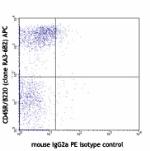
Balb/c mouse splenocytes double stained with 330-AJ PE (lowe... 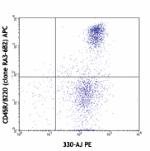
-
Pacific Blue™ anti-mouse Ly108
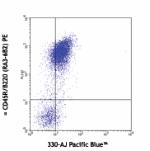
C57BL/6 splenocytes stained with 330-AJ Pacific Blue™ ... 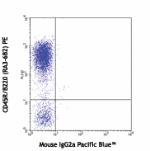
C57BL/6 splenocytes double stained with mouse IgG2a isotype ... -
APC anti-mouse Ly108

C57BL/6 splenocytes stained with CD45R/B220 FITC and Ly108 (... -
TotalSeq™-A0930 anti-mouse Ly108 Antibody
-
TotalSeq™-C0930 anti-mouse Ly108 Antibody
-
TotalSeq™-B0930 anti-mouse Ly108 Antibody
 Login/Register
Login/Register 










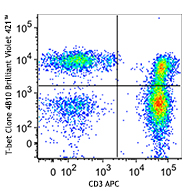
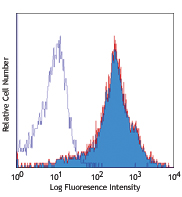




Follow Us